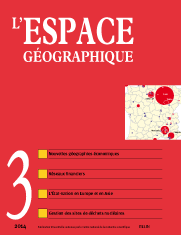

Isabelle GÉNEAU DE LAMARLIÈRE. Contemporary economic geography: between fragmentations and reconstructions
Sketch of a territorial economic geography
This paper focuses on the emergence of “territorial” dynamics in production processes, as highlighted by the appearance of different types of clusters. This leads to radical changes in the relationship between Geography and Economics. The fact that local stakeholders tend to organize themselves in terms of their geographical context creates a mesoeconomic level, i.e. one which is neither micro nor macro. The key characteristic of this trend is that the context influences the value of what is produced. Opposition between “territory” and the main economic functions of production and consumption opens new perspectives for economic geography analysis.
keywords: CLUSTER, ECONOMIC GEOGRAPHY, MESO-ECONOMY, TERRITORY
Cities and regions of cognitive capitalism and culture
Global production networks in finance. The example of Luxembourg’s investment fund industry (2 fig.; 2 tables)
This paper discusses the structure of Luxembourg as a financial centre – with particular focus on the investment fund industry – using the lens of the global production networks framework, thus identifying and analysing the driving forces, principal structural processes and power relations at work. It calls for a fruitful triangulation with conceptual approaches from related disciplines. The paper argues, first, that the application of the global production networks framework to finance deepens our understanding of the ‘‘social fabric’’ of firm-firm and firm-institution relations, and second, that the conceptual development of global production networks analysis itself would benefit from more and stronger empirical examples from the financial sector to emphasise resilience building on local financial economies that are globally embedded.
keywords: ECONOMIC GEOGRAPHY, GLOBAL PRODUCTION NETWORKS, INVESTMENT FUNDS, NETWORK APPROACHES, SOCIAL CAPITAL
Nation-State as a territorial myth of European construction
The nation State is central concept in the narration of European integration. It has a mythical function. This myth prevents us that the European Union is first and foremost a spatial experience. Indeed, its foundation is circulation and mobility; and it is a process of mutualization of sovereignty and territory. As a matter of fact, a very large geohistorical range of type of sovereignty and territoriality are the ingredients of this very new European experience. The equation ‘European equal nation-State’ is an obstacle to the acknowledgement of this experience. Demystify the place of the nation State as the political territory in Europe contributes to understand what the Europeans are building and to their future.
keywords: EUROPE, EUROPEAN UNION, NATION, STATE, SOVEREIGNTY, TERRITORY
Nation-States in the Eurasian space originating from Empires, City-States, Mandala States: What do they owe to the Western European model?
The Western Nation-state, based, in the modern era, on democratic citizenship or ethno-nationalism, spread to Central Europe, the Balkans and the World after the fall of multi-ethnic Empires and subsequently, colonial Empires. These Nation-States have their origins in ancient Empires (Iran, China and Vietnam) or Precolonial Mandala-States (South-East Asia). These pre-existing state structures evolved into Nation-States as a result of colonial domination or strong reformist and modernizing Western influence. Expansion into their ethno-national form was sometimes accomplished with violence (Turkey, Balkan states), causing the emergence of national minorities, which may claim the right to establish their own Nation-State.
keywords: CITY-STATE, EMPIRE, MANDALA-STATE, NATION-STATE, POSTCOLONIAL, PRECOLONIAL, TERRITORIAL STATE
Disperse, confine or recycle? A geo-legal approach to the management and the spatial circulations of low-level radioactive waste in France (3 fig.)
Since the 1960s, “managing” radioactive waste has become a policy imperative. Set in a legal geography framework, this paper shows that in France low-level waste management hinges on a “geo-legal dispositive” – a set of legal norms intended to control the spatial circulation of radioactive materials. By analyzing the genesis and the operation of the dispositive, the paper unpacks the spatial productivity of normative mechanisms for the management of things. The paper demonstrates that the existing dispositive has created unintended consequences (disposal site saturation, costs) that compromise its stability.
keywords: LEGAL GEOGRAPHY, NUCLEAR INDUSTRY, RADIOACTIVE WASTE, RECYCLING, WASTE MANAGEMENT
Book reviews
In this issue of l’Espace géographique, you will find critical reviews of the following books
DARDEL É. (2014). Écrits d’un monde entier. Édition établie et présentée par Alexandre Chollier avec la collection d’Éric Waddell. Genève: Éditions Héros-Limite, coll. «Géographie(s)»,407 p. (François Walter, université de Genève) ISBN: 978-2-940517-05-3
GAUTIER DALCHE P. (dir.)(2013). La Terre. Connaissance, représentations, mesure au Moyen Âge. Turnhout: Éditions Brepols, coll. «L’atelier du médiéviste», n° 13, 710 p. (Christian Grataloup, université Paris 7-Diderot) ISBN: 978-2-503-54753-4
CATTARUZZA A. (2014). Atlas des guerres et des conflits. Un tour du monde géopolitique. Paris: Autrement, coll. «Atlas Monde», 96 p. (Yann Richard, université Paris 1 Panthéon-Sorbonne) ISBN: 978-2-7467-3558-3
MARGÉTIC C., BERMOND M., JOUSSEAUME V., MARIE M. (coord.)(2014). Atlas des campagnes de l’Ouest. Rennes: Presses universitaires de Rennes, coll. «Espace et territoires», 299 p. (Guy Baudelle, université de Rennes 2) ISBN: 978-2-7535-3373-8
L’espace géographique 2/14![]()
![]() L’espace géographique 4/14
L’espace géographique 4/14
For subscribe or buy this issue: BELIN
![]() L’Espace géographique: contents
L’Espace géographique: contents
Last modified: December 1, 2014